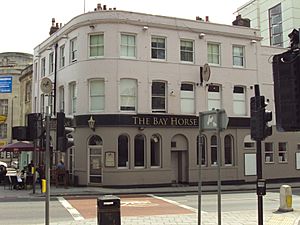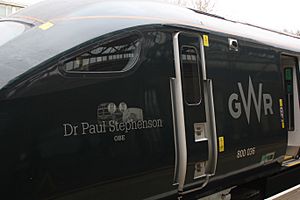Paul Stephenson (civil rights campaigner) facts for kids
Quick facts for kids
Paul Stephenson
|
|
|---|---|
| Born | 6 May 1937 |
| Died | 2 November 2024 (aged 87) |
| Occupation | Community worker |
| Known for | Civil Rights activism, community relations |
| Title | Doctor |
Paul Stephenson, who was awarded the OBE, was a British community worker and activist. He was a long-time champion for civil rights for the British African-Caribbean community in Bristol, England. He was born on May 6, 1937, and passed away on November 2, 2024.
In 1963, as a young social worker, Stephenson led a protest called the Bristol Bus Boycott. This protest was against the Bristol Omnibus Company because they refused to hire Black or Asian drivers or conductors. After 60 days, the company changed its unfair rule. In 1964, Stephenson became well-known when he refused to leave a public house until he was served. His actions helped lead to the first Race Relations Act in 1965. Stephenson was given the Freedom of the City of Bristol and received an Officer of the Order of the British Empire (OBE) award in 2009.
Contents
Early Life and Work
Stephenson was born in Rochford, Essex, on May 6, 1937. His father was from West Africa and his mother was British. When he was three, he moved to a care home in Great Dunmow, Essex, for seven years. He went to Forest Gate Secondary School in London. He was the only Black child at that school.
From 1953 to 1960, he served in the Royal Air Force. In 1962, Stephenson earned a diploma in Youth and Community Work. He then moved to Bristol to work for Bristol City Council. He became the city's first Black social worker.
The Bristol Bus Boycott
In 1955, a local transport union decided that "coloured workers should not be employed as bus crews." The Bristol Evening Post newspaper wrote articles in 1961 about this unfair rule. The bus company's manager, Ian Patey, admitted the rule existed. He claimed that hiring Black workers would make other (white) staff leave.
Members of Bristol's West Indian community formed a group to fight this unfair treatment. Paul Stephenson helped them. In 1963, Stephenson confirmed that the bus company was indeed refusing to hire Black people. He was inspired by Rosa Parks, who famously refused to give up her seat on a bus in America. This led to the Bristol Bus Boycott.
Stephenson became the voice for the boycott. The protest quickly gained national attention. Many people in Bristol, including Tony Benn, a local Member of Parliament, and Harold Wilson, the leader of the Labour Party, supported the campaign. After 60 days, on August 28, 1963, the bus company gave in. In September, Raghbir Singh became Bristol's first non-white bus conductor. This was a big victory for equality.
In August 2014, a special plaque was placed inside Bristol Bus Station. It remembers the important bus boycott.
Fighting for Equality

The year after the bus boycott, Stephenson became well-known again. He went to the Bay Horse pub in Bristol and was refused service. The bar manager reportedly told him, "We don't want you black people in here." Stephenson refused to leave without being served. He was arrested for this.
The case got a lot of media attention. The Bristol Evening Post wrote a story with the headline "West Indian leader made a fool of himself." At his trial, some people claimed he acted aggressively. However, witnesses said this was not true. The case was dismissed, and the barman was fired by his employers.
After this, Stephenson moved to Coventry to work as a Senior Community Relations Officer. In 1972, he went to London to work for the Commission for Racial Equality. While in London, he worked with the famous boxer Muhammad Ali. They set up the Muhammad Ali Sports Development Association in Brixton. He also helped create the Cleo Laine Schools' Music Awards with Cleo Laine and John Dankworth.
In 1975, he joined the Sports Council. He strongly campaigned against sports teams having contact with apartheid South Africa. Apartheid was a system of racial segregation. In 1979, Stephenson became the honorary president of Bristol's West Indian Parents' Association. In 1981, he was appointed to the Press Council.
When he returned to Bristol in 1992, he helped start the Bristol Black Archives Partnership (BBAP). This group "protects and promotes the history of African-Caribbean people in Bristol." He began it by giving his own personal records to Bristol Record Office for safekeeping.
Later Years and Passing
Paul Stephenson passed away on November 2, 2024, at the age of 87. In his final years, he had been living with Parkinson's disease and dementia.
Awards and Legacy
Paul Stephenson received many awards for his important work. In 1988, he got the Bristol City Council Community Award. He also received the West Indian Community Publishers Award. Other awards include the Bristol West African and Caribbean Council Community Achievers' Award in 1996. In 2006, he received the city council's One Person Can Make a Difference Award.
In 2007, Stephenson was given the Freedom of the City of Bristol. He was the first Black person to receive this special honour. The award recognized his dedication to improving race relations and encouraging community involvement. It also noted his role in starting the Bristol Black Archives Project.
In 2009, he was given an OBE award for his "services to equal opportunities and to community relations in Bristol." He also received honorary degrees from two universities. In 2009, the University of the West of England gave him a Master of Education degree. In 2014, the University of Bristol gave him a Doctor of Law degree. These awards recognized his pioneering work in race relations.
In November 2017, Stephenson received a Pride of Britain Award for Lifetime Achievement. The famous comedian Lenny Henry presented it to him. Henry said that Stephenson was "a giant" who helped make Britain a more open and fair place. The judges said his courage and determination changed how everyone lives for the better.
In June 2020, after the Edward Colston statue was removed in Bristol, a campaign started to replace it with a statue of Paul Stephenson. On October 20, 2020, Great Western Railway named one of its trains (800 036) in Stephenson's honour. This happened at a ceremony at Bristol Temple Meads station.
Archives and Papers
Photographs, newspaper clippings, letters, and other items about Paul Stephenson are kept at Bristol Archives. These records also include information about the 40th anniversary of the Bristol Bus Boycott campaign. The Bristol Black Archives Partnership collections are also held there.
 | Charles R. Drew |
 | Benjamin Banneker |
 | Jane C. Wright |
 | Roger Arliner Young |


